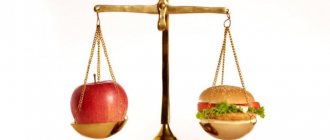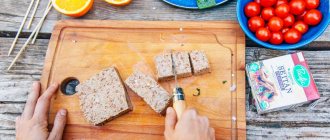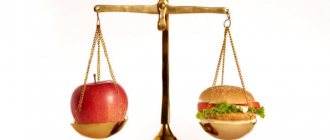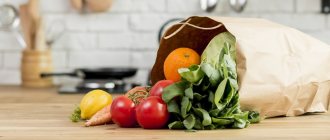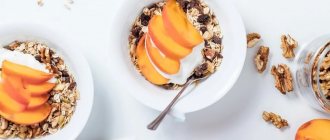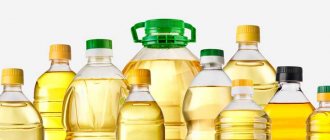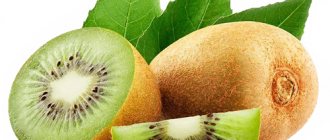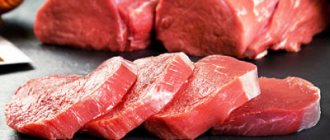Proteins for the human body. Useful properties of proteins, meaning, functions
Proteins and products containing protein play an important role for the body and human health, and a balanced and good diet is the key to excellent well-being .
To stick to proper nutrition, you need to know which foods contain protein.
It has long been known that the human body consists of 14.7 percent proteins , since proteins are an important element in the human body. They influence the processes of growth, digestion, reproduction, and are the basis of antibodies, hormones and various enzymes.
Proteins are of plant origin and also of animal origin, and it is the latter that are more important for the body; they are digested faster and better absorbed. Plant proteins are more difficult to digest due to their fiber shell (it is this fiber that interferes with digestive enzymes and delays the entire process).
Is it possible to eat only proteins?
Protein diets are useful for those who want to lose weight, but you need to know in moderation. Doctors and nutritionists do not recommend eating exclusively proteins, since their excessive consumption does not have a positive effect on the body, but, on the contrary, negatively, leading to problems with the liver and kidneys.
This is especially harmful for children, since their diet should include a variety of foods and a balanced diet. If children are fed only protein foods, they may experience growth retardation.
Slow and fast proteins
Slow proteins are proteins with a large amount of calories that cannot be absorbed quickly, only over a long period of time. Also, the body spends more energy on their processing.

Fast proteins are proteins that are absorbed by the body in a short amount of time, mainly animal products.

Fast proteins are useful for those who play sports or lead a very active and active lifestyle with a lot of physical activity.
List of foods with “slow” protein
Products:
- Soy.
- Polka dots.
- Buckwheat.
- Corn.
- Rice.
- Beans.
- Wheat.
- Oats.
- Rye.
- Peanut.
List of foods with “fast” protein
Products:
- Milk (cow's).
- Chicken eggs.
- Cheese products.
- Curds.
- Kefir.
- Beef.
- Chicken meat.
- Lean pork.
- Some types of fish.
The healthiest protein foods
There are many protein products available today. However, you can still identify the healthiest protein foods; the list of products consists of 4 main sources:
- Chicken breast. For an athlete and anyone watching their weight, this is an integral part of the diet. 190 grams of breast contains only 200 kcal, 40 g of protein, and only 2 g of fat. To get the most benefit from the product, you need to boil or grill the breast, excluding the use of oil.
- Beef meat. A person cannot survive on one breast for long, so beef is an excellent alternative that will also not harm your figure. Per 200 grams there are 340 kcal, about 40 g of protein, 15 g of fat.
- Chicken eggs. To get 40 g of protein from chicken eggs, you need to consume 7 eggs, which contain 520 kcal and 35 g of fat. Chicken proteins are mostly beneficial for the body, but yolks are also necessary for better absorption of the purest protein.
- Salmon fillet is a storehouse of healthy Omega 3 fats. 200 g of salmon contains 368 kcal, 40 g of protein and 28 g of fat. The fillet of this rather expensive fish can be replaced with hake or pollock.
Foods that are high in protein. List
You can find out which foods contain a lot of protein from the list:
- Meat products and poultry.
- Various seafood, different types of fish.
- All sorts of different fruits and different vegetables.
- Seeds and also nuts.
- A variety of dairy products.
- Eggs (not just chicken).
Meat products, as well as poultry: lean cow meat, chicken meat such as fillet or breast, turkey (fillet is best), rabbit.
Fish, as well as various seafood: salmon, mackerel, shrimp (various).
Fruits and a variety of vegetables: bananas, beans, avocados, spinach.
Seeds and nuts: a wide variety, for example, walnuts or Brazil nuts, hazelnuts and so on.
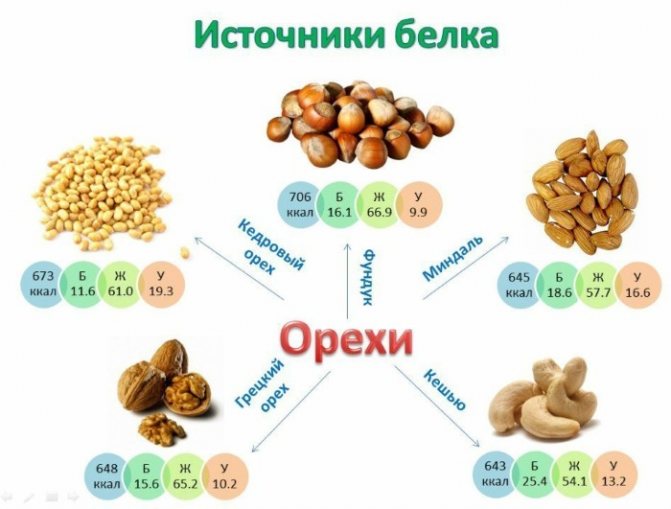
Dairy: cottage cheese, milk itself (cow's), and so on.
Cheeses: a wide variety.
Complete and incomplete proteins
In the process of digesting proteins from food, they are broken down into amino acids . These amino acids are then used to build the proteins the body needs. Thus, it is not just protein that is important to you, but the composition of amino acids.
Amino acids are divided into essential and non-essential . Replaceable ones can be synthesized in the human body. Essential ones , on the contrary, come only with food. For this reason, if there is a shortage of any essential amino acid, a certain protein will not be created, which will ultimately lead to certain consequences.
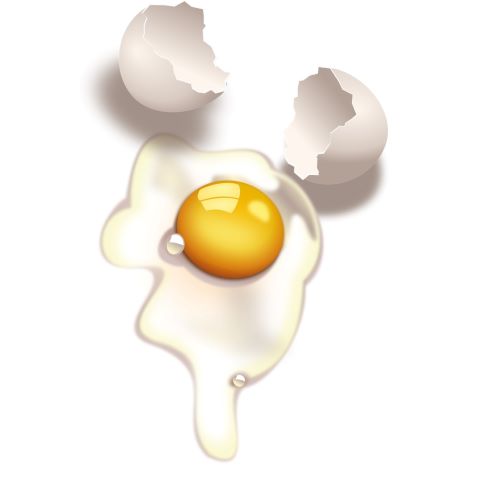
Sources:
- egg whites;
- liver;
- milk and dairy products (except sour cream and butter);
- Fish and seafood;
- meat, poultry;
- soybeans
Proteins that contain only some of the essential amino acids are called incomplete .
Sources:
- grain crops;
- legumes (except soybeans);
- nuts and seeds;
- vegetables.
Vegetable protein. Grocery list
The following products will have the greatest amount of vegetable protein:
- Legumes: lentils, etc.
- Nuts: peanuts, etc.
- Various seeds: pumpkin seeds and sunflower seeds.
- Hummus.
- Dried fruits: dried apricots, prunes.
- Fruits: for example, bananas.
Protein with fiber - products
Some products immediately contain both the required amount of protein and fiber, which is very important for the body. These foods include some fruits and vegetables, as well as nuts (hazelnuts or peanut butter if you can't buy nuts) and various seeds.
Nuts and seeds that contain protein
This table below lists the most popular nuts, as well as some seeds that contain protein.
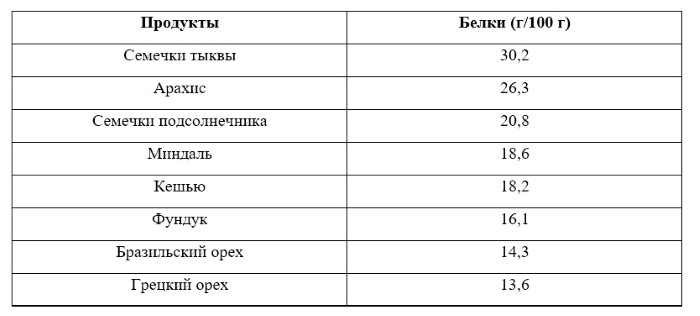
Cereals and legumes that are high in protein
This table shows the most popular cereals and legumes that contain a lot of protein.
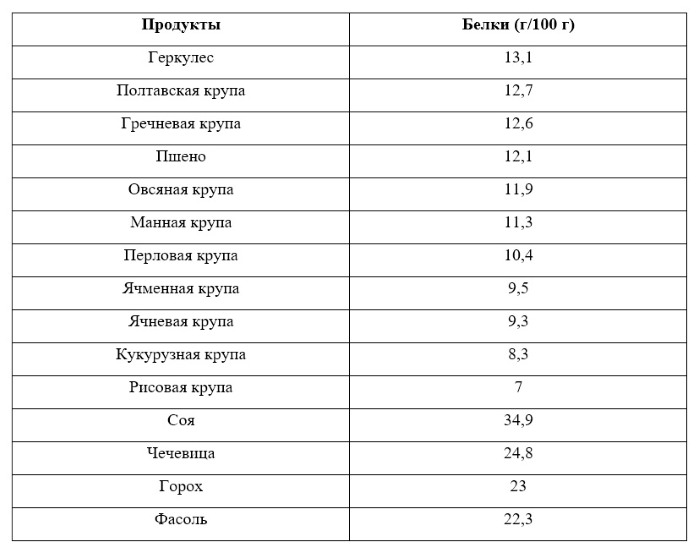
What vegetables contain protein?
Products:
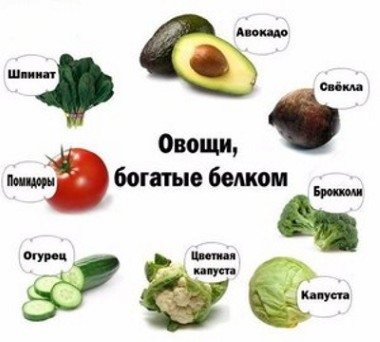
- Brussels sprouts and cauliflower.
- Broccoli.
- Pumpkin.
- Beet.
- Turnip.
- Carrot.
- Celery.
- Bulgarian pepper.
- Radish.
- Swede.
- Tomatoes and tomatoes.
Animal protein. Grocery list
The following foods contain the largest amounts of animal protein:
- A variety of meat products.
- Fish.
- Milk.
- Curd products.
- Various eggs.
Meat products
List:
- Lean beef.
- Chicken fillet.
- Chicken breast.
- Turkey meat (fillet is best).
- Rabbit meat.
- Deer meat.
Seafood
List:
- Salmon.
- Tuna.
- Mackerel.
- Sardines.
- Shrimps.
- Lobsters.
- Squid.
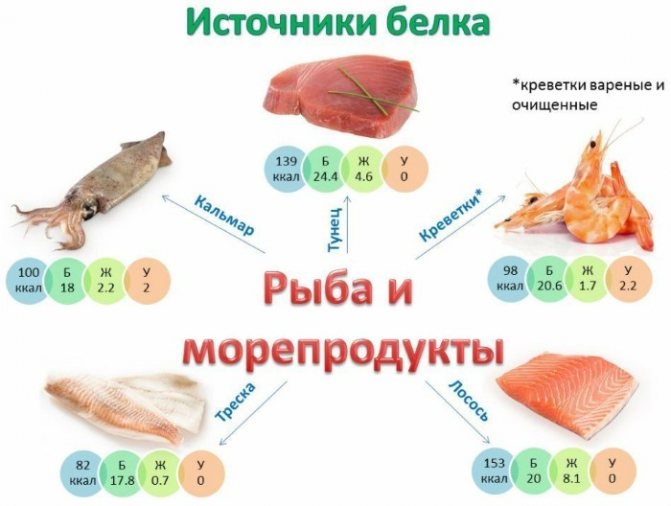
Dairy and fermented milk products
Milk proteins are special natural proteins - proteins of animal origin, which are more easily and quickly absorbed by the human body.
These dairy and fermented milk products include:
- milk,
- curdled milk,
- kefir,
- cheese,
- cottage cheese,
- sour cream.
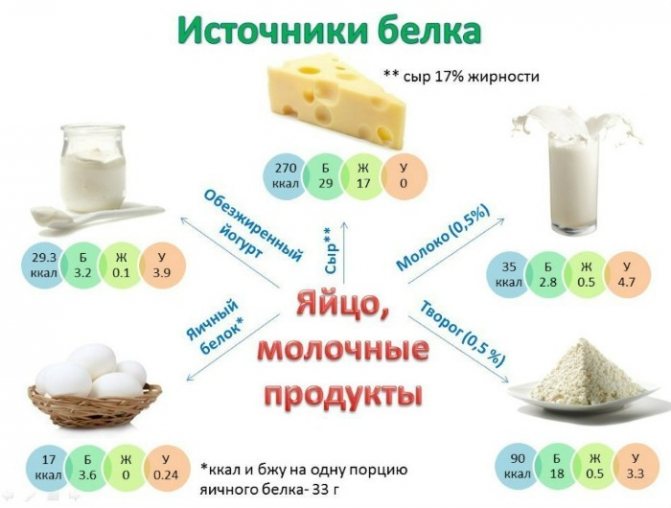
It is these products that should be present in the diet of every person, regardless of his desire to lose weight or build muscle mass.
Milk proteins increase the performance of the entire body, as well as its endurance.
In addition, such proteins are easily digestible due to the fact that they do not change the acid-forming function.
Protein-rich foods for weight loss
What foods contain protein that are recommended to eat when losing weight:
- Dietary meat: it is best to take chicken fillet.
- Fish.
- Some seafood.
- Milk.
- Egg whites.
- Cottage cheese (necessarily low-fat, it is best to take it fresh, from the market, and not in boxes with a long shelf life).
- Cheeses (the fat content of such cheeses should not exceed 25%).
- Soy milk.
- Soy cheeses (including tofu).
Vegetarianism and protein
Each person makes his own choice about how and what to eat. Vegetarianism has been gaining popularity in recent years. Increasingly, due to moral and ethical convictions, people refuse meat, or animal food in general.
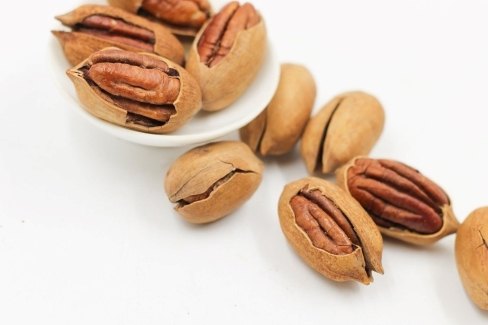
They need to plan their diet very carefully to provide themselves with the necessary amount of essential amino acids. With the right approach, you can replace animal protein with plant protein.
For example, cereals contain little of the amino acid lysine and a lot of the amino acid methionine. Beans, on the contrary, are high in lysine and low in methionine. So consume both regularly. Although not necessarily in one meal.
You are recommended to eat a variety of plant foods: cereals, legumes (beans, lentils, peas and chickpeas), nuts, seeds, broccoli, etc.
Read more: Vegetarianism. How to stay healthy? Advice from professionals
Protein diet for weight loss and health. Principles
The protein diet is a special and very effective type of diet, in which the diet of a losing weight person contains only those foods that contain a really large amount of proteins.
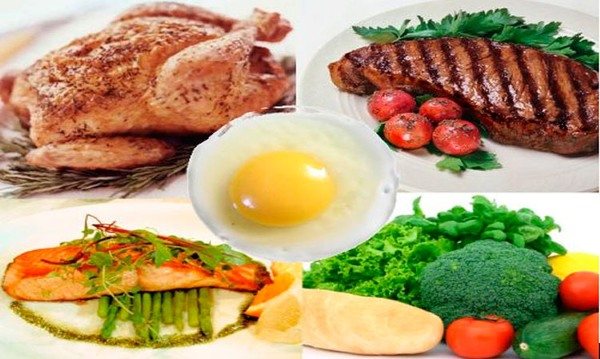
The main advantage of a protein diet is that proteins in the body help carbohydrates to be absorbed faster, thereby maintaining the necessary and stable sugar level in the blood.
At the same time, the body spends more energy for processing , protein is more difficult to digest than the same carbohydrates or fats. That is why this type of diet is considered the most effective for those who are struggling with excess weight.
Benefits of a Protein Diet
The main advantages and benefits of a protein diet are that it muffles the feeling of hunger, which usually always accompanies a person losing weight, and that weight loss is carried out by burning fat, and not by gaining muscle mass.
In addition, this diet is perfect for those who are intensely involved in any kind of sport or simply lead a very active and active lifestyle.
Weight decreases quickly; after finishing the diet, the kilograms do not return, as happens with other diets.
On average, in 2 weeks of such a diet you can lose from 4 to 9 kilograms!
Disadvantages of a protein diet
Despite a fair number of advantages, a protein diet (eating foods that contain protein) also has its disadvantages, of which there are also many.
The biggest disadvantage is that such a diet implies an unbalanced diet, which is not very good for the body. The lack of vitamins can negatively affect sleep and performance (a person will get tired and exhausted faster).
With such a diet there is a very large load on the kidneys.
High consumption of calcium in the body.
A protein diet can negatively affect the functioning and proper functioning of the gastrointestinal tract.
This diet is contraindicated for those who have heart or vascular problems.
List of products and how to create a menu
When creating a menu, it is recommended to choose natural products, preferably lactose-free.
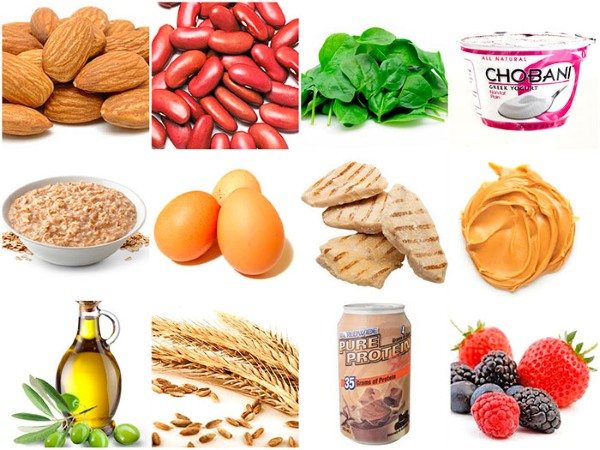
Of the proteins, those proteins that have been subjected to heat treatment are most easily and quickly absorbed.
Grocery list:
- Chicken fillet.
- Veal.
- Rabbit meat.
- Fish with white meat.
- Shrimp, squid.
- Milk.
- Various eggs.
- Curds.
- Cheese.
- Soy cheese.
Sample menu for the week
Monday:
- Kefir, omelet (from 3-4 proteins), drinks – tea.
- The chicken is boiled, you can add spices to it. Apple.
- Fish baked in the oven, 150 g with spices and parsley, dill.
Tuesday:
- A tomato, two hard-boiled eggs, maybe yogurt.
- 100 g of meat, steamed exclusively, salad.
- 150 g of lettuce and cucumber salad.
Wednesday:
- Oatmeal (porridge) with dried fruits or nuts, tea, maybe coffee.
- Chicken breast, boiled, salad.
- Steamed fish, a glass of boiled beans, a glass of yogurt.
Thursday:
- 150 g of natural cottage cheese, tea (preferably green), nuts.
- Chicken broth, chicken breast, vegetables.
- Something meat, definitely baked, salad.
Friday:
- Fresh vegetable salad, yogurt, but only natural and without additives.
- Broccoli soup, boiled chicken breast. Bread.
- Fresh cabbage and pea salad, baked breast (can be topped with cheese).
Saturday:
- Omelet, a little ham, tea.
- 100 g steamed fish.
- Stew of meat and vegetables, yogurt. You can have kefir.
Sunday:
- 150 g of cottage cheese with dried apricots or prunes, green tea.
- Cooked buckwheat, some meat, maybe fish.
- 150 g meat with herbs (baked), kefir.
How to get off a protein diet correctly
In order for the body to experience less stress when leaving the diet, it must be done correctly and gradually.
It is recommended to regularly drink sugar-free drinks and try to eat less sweets and starchy foods.
It is better to have breakfast with porridge (for example, oatmeal) or cottage cheese.
It is recommended to eat more fresh vegetables and fruits.
Contraindications
A protein diet is contraindicated for people suffering from heart or vascular problems, as well as for people who have severe problems with the stomach and digestive process.
This diet is not recommended for those who have problems with the kidneys and liver.
Under no circumstances should anyone who has any type of cancer follow this diet.
It is also not recommended for older people to follow this type of diet, as it increases the risk of blood clots.
Principles of a protein-free diet
Protein restriction allows you to reduce weight or relieve excess stress on certain organs. Reducing protein intake is the principle of a protein-free diet. Products containing building materials for the body should be consumed in small quantities.
The diet is not intended for quick weight loss. During this period, it is not recommended to increase physical activity, since protein will be required to replenish muscle energy. A protein-free diet includes a large amount of carbohydrates, which also do not contribute to weight loss.
The daily amount of calories is about 2000. There is no point in using such a diet for weight loss for a healthy person. It is better to have protein-free days a couple of times a week.
Basically, protein restrictions are imposed by doctors for kidney or liver disease. The diet is therapeutic and allows the body to independently remove nitrogenous compounds, which play a negative role in diseases of internal organs.
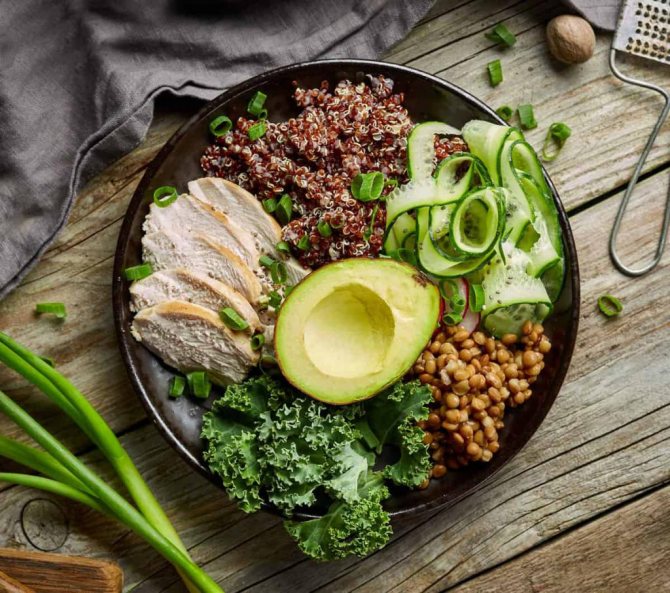
How and what kind of proteins to use for muscle growth in bodybuilding
Not only those who want to lose weight, but also athletes who want to build muscle mass take special care when consuming protein.
An athlete's diet should consist of 50% protein , preferably of animal origin; experts recommend consuming about 1.5 or 2 grams of protein per kilogram of weight.
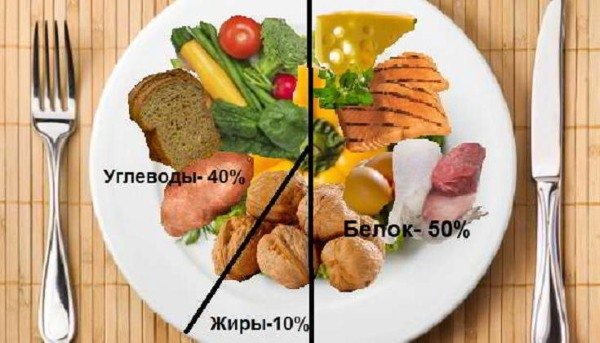
For accelerated muscle growth, it is recommended to consume large amounts of protein foods, as well as special protein shakes.
Popular Protein Foods for Muscle Growth
What foods contain protein and which of them are recommended for those who want to gain exactly the desired muscle mass required for themselves.
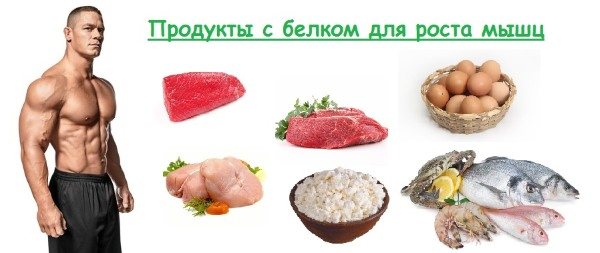
These products include:
- Beef.
- Tuna.
- Cottage cheese.
- Turkey.
- Chicken.
- Eggs.
- Fish.
Protein shakes (recipes)
Recipes:
- Ingredients: 250 ml of fresh milk, you can add 2 or 3 tbsp. l. honey to taste, ripe soft banana, natural yogurt, any oatmeal. Mix all ingredients thoroughly in a blender.
- Ingredients: 100 g of natural fresh (without additives) cottage cheese, 100 g of natural cherry juice, egg white. All ingredients are thoroughly mixed using a blender.
- Ingredients: 0.5 l of milk, 50 g of honey or any jam with a little sugar to taste, 250 g of fresh natural cottage cheese, 100 g of milk powder, 100 g of thick sour cream, dried fruits. The ingredients are mixed in a blender.
Daily protein intake
You all constantly need amino acids. They fulfill their function and disintegrate. Part of it enters the bloodstream and is used again, the other part is disposed of.
Proteins are vital. Therefore, every adult should consume at least 40–50 g of protein per day.
In fact, 40-50 g is the minimum intake that is necessary for your life.
Your needs depend on your caloric intake . Calorie content, in turn, depends on gender, weight, age, and physical activity. Having calculated your individual calorie content and taking into account that 1 g of protein has a calorie content of 4 kcal, your norm is calculated. Therefore, to say that each person needs 1, - 1.5 or 2 g of protein per 1 kg of weight per day is incorrect.
The approximate daily intake is shown in the table below in grams.
As an example, calculations were carried out for a man and a woman of 30 years old, of average height with low activity.
In the case of weight gain, average activity was taken (3 workouts per week).
Depending on your weight and gender, you can use the data from the table as the basis for your diet. I repeat, the figure is approximate. Such calculations are carried out according to certain formulas, according to your age, height, weight, activity and your goals.
| 50 -55 kg | 55-60 kg | 60-65 kg | 65-70 kg | 75-80 kg | 80-85 kg | |
| Men | ||||||
| Weight loss | 145 | 150 | 155 | 160 | 165 | 170 |
| Weight maintenance | 136 | 141 | 145 | 150 | 155 | 160 |
| Muscle gain | 200 | 210 | 220 | 230 | 240 | 250 |
| Women | ||||||
| Weight loss | 122 | 127 | 132 | 137 | 142 | 147 |
| Weight maintenance | 116 | 120 | 124 | 128 | 132 | 136 |
| Muscle gain | 170 | 177 | 184 | 191 | 198 | 205 |
Here we mean not only animal, but also plant protein. This means take into account not only meat, eggs, but also bread, dairy products, cereals, vegetables, fruits, etc. Therefore, whatever your goals, most likely you will not have to make a huge effort in order to achieve your norm .
When protein needs increase
- With increasing physical activity (hard work, training to increase muscle mass, etc.).
- During illness, and during recovery, as well as during stress.
- During intensive growth and development.
- During pregnancy and breastfeeding.
- During the cold season.
When protein requirements decrease
- In the warm season.
- With age. The older a person is, the less protein he needs.
Signs of protein deficiency
- Fatigue, weakness, fatigue.
- Decreased muscle volume.
- Growth retardation in children.
- Dry, flabby skin.
- Dry, dull, brittle hair.
- Decreased resistance to various infections.
- Anemia.
- Swelling.
- Violation of the functions of the body systems: cardiovascular, nervous, circulatory, gastrointestinal tract, etc.
Causes of deficiency
- Lack of protein in food.
- An unbalanced diet due to eating only plant foods, fasting or vegetarianism. You can eat protein foods, but still not get the full range of essential amino acids.
- Gastrointestinal diseases.
- Malabsorption.
- Hormone deficiency.
Excess protein in the body
Chronic consumption of large amounts of protein can cause:
- gastrointestinal, renal and vascular disorders;
- decreased natural immunity, which leads to infectious diseases;
- risk factor for cancer.
Popular low protein foods. List
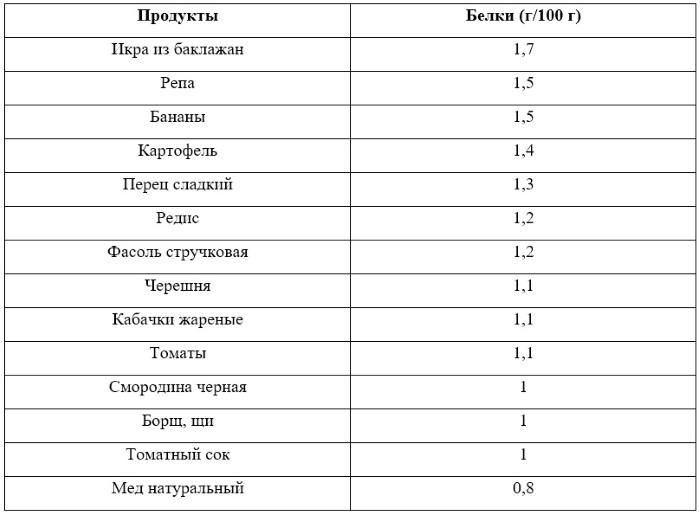
What foods contain protein:
- various milks,
- some types of meat,
- various cereals,
- fruits,
- vegetables,
- seeds,
- nuts,
- fish.
Eating protein and foods that contain protein helps those who are overweight to lose weight, but you can’t eat only protein - this can negatively affect your health, and large amounts of protein should be consumed when the main goal is to gain muscle mass.
